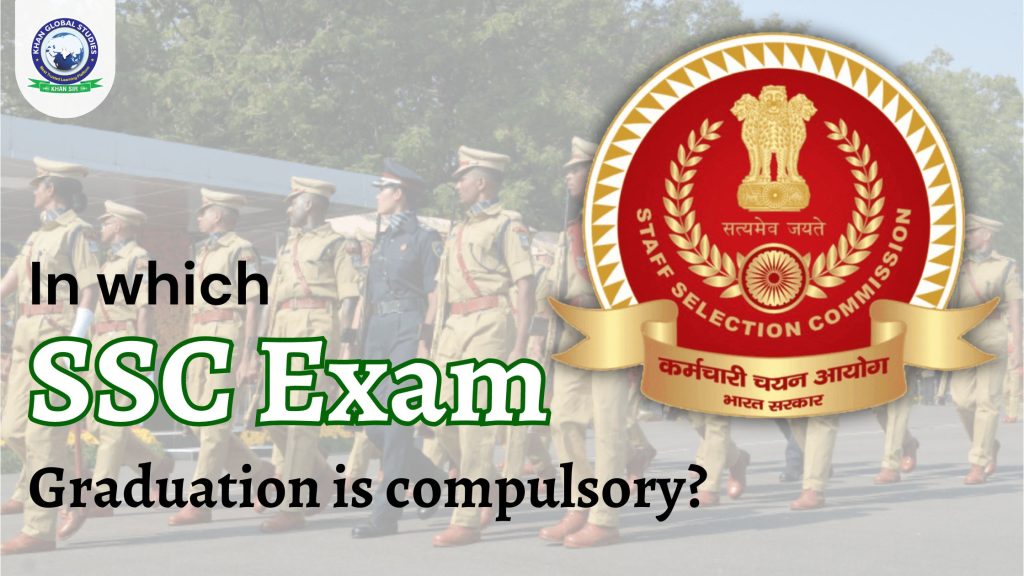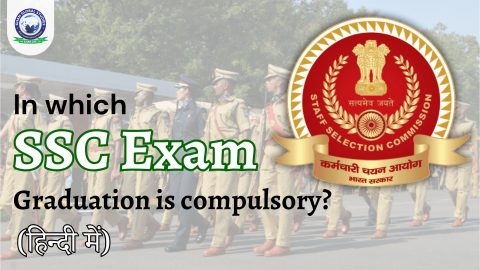The Staff Selection Commission (SSC) conducts several exams every year to recruit eligible candidates for various government jobs. However, different exams have different educational qualifications, with some requiring only passing 10th or 12th standard and others requiring a graduation degree. It is important for candidates aspiring to pursue a career in government services to understand which SSC exams require a graduation degree as the minimum qualification.
In this article, we will outline all the major SSC exams where a graduation degree is mandatory, along with essential details about these exams, eligibility criteria, and the types of roles offered.
Why is Graduation required for certain SSC Exams?
Graduation is required for specific SSC exams as the nature of roles and responsibilities handled by the selected candidates vary. Positions requiring high-level decision-making, supervisory roles, or specific domain knowledge often demand candidates to complete a graduation degree. This educational limit ensures that applicants have the basic skills, understanding, and maturity required for such roles.
SSC Exams that Require Graduation
1. SSC Combined Graduate Level Exam (CGL)
The SSC CGL exam is one of the most sought-after competitive exams conducted by the SSC for graduate-level posts in various government departments. It recruits candidates for Group B and Group C posts covering a wide range of responsibilities in ministries, government departments, and organizations.
Eligibility Criteria for SSC CGL:
- Minimum Education: Graduation in any discipline from a recognized university.
- Age Limit: Age criteria vary depending on the specific posts. Generally, it ranges from 18 to 32 years, with age relaxation for candidates from reserved categories.
Job Profiles Under SSC CGL:
Some of the major posts offered under SSC CGL include:
- Assistant Section Officer (ASO) in various ministries.
- Income Tax Inspector in the Income Tax Department.
- Assistant Audit Officer (AAO) in the Indian Audit and Accounts Department.
- Sub-Inspector in CBI, Narcotics, etc.
Given the importance of these roles, graduation is a mandatory criterion to appear for this exam.
2. SSC CPO (Central Police Organisation)
The SSC CPO exam is another important exam for graduates, aimed at recruiting individuals to the post of Sub-Inspector (SI) in Delhi Police, CAPFs (Central Armed Police Forces) and Assistant Sub-Inspector (ASI) in CISF (Central Industrial Security Force).
Eligibility Criteria for SSC CPO:
- Minimum Education: Graduation in any stream from a recognized university.
- Physical Standards: Candidates must meet the specified physical criteria such as height, chest measurement and fitness standards based on gender and category.
- Age Limit: Candidates between 20 and 25 years are eligible with applicable relaxations for reserved categories.
- Roles and Responsibilities: Sub-Inspectors are tasked with maintaining law and order, conducting investigations and leading security operations in police forces.
Graduation is a must for these posts due to the need for leadership and analytical skills to handle high-pressure situations in law enforcement.
3. SSC Junior Statistical Officer (JSO)
SSC JSO is a specific post under the SSC CGL recruitment process. However, this post requires a unique educational qualification beyond graduation.
Eligibility Criteria for SSC JSO:
- Minimum Education: Bachelor’s degree in any subject with at least 60% marks in Mathematics at the 12th standard level or Bachelor’s degree in any subject with Statistics as one of the core subjects at the graduation level.
- Age Limit: The age limit generally ranges between 18 to 32 years.
This specific educational requirement is due to the statistical nature of the work involved, which requires candidates to have strong numerical skills and be familiar with statistical analysis.
4. SSC CHSL (Combined Higher Secondary Level) for DEO Grade “A”
While the SSC CHSL exam primarily targets candidates with a 12th-class qualification, there is an additional requirement for the post of Data Entry Operator (DEO) Grade A.
Eligibility Criteria for SSC DEO Grade A:
- Minimum Education: Graduation from a recognised university.
- Additional Skills: Candidates must have excellent data entry skills, with a minimum speed of 8,000 key depressions per hour.
The role of DEO under Grade “A” often involves working with highly sensitive and technical data, which is why graduation is mandatory for this post.
5. SSC JE (Junior Engineer)
The SSC JE exam recruits candidates for the post of Junior Engineer in various engineering fields, such as civil, mechanical, electrical and quantity surveying.
Eligibility Criteria for SSC JE:
- Minimum Education: Diploma in Engineering or Graduation in the relevant field from a recognized university or institute.
- Age Limit: The age limit varies depending on the post, but generally ranges between 18 to 32 years.
- Engineering posts require a deep understanding of technical subjects, and thus, graduation in the relevant field of engineering is a must.
6. SSC Scientific Assistant in IMD
The Scientific Assistant exam conducted by the India Meteorological Department (IMD) through SSC is another role that requires graduation.
Eligibility Criteria for Scientific Assistant:
- Minimum Education: Bachelor’s degree in Science (Physics as a subject) or Diploma in Electronics and Telecommunication Engineering from a recognized university or institute.
- Age Limit: Candidates must be below 30 years of age at the time of application.
Graduation ensures that candidates have the scientific knowledge required to handle meteorological tasks effectively.
How to prepare for SSC Exams requiring Graduation?
- Understanding the Exam Pattern and Syllabus: Each SSC exam has a unique pattern and syllabus, and understanding it is crucial for preparation. For example, the SSC CGL has four levels, including objective-type questions, descriptive tests, and skill tests. Make sure you are familiar with the entire syllabus and question types.
- Build Strong Fundamentals: Graduates often perform better in SSC exams, which require a high level of reasoning and analytical thinking. Work on strengthening your basic knowledge in subjects like mathematics, general awareness, English, and reasoning. Advanced positions also require knowledge in specific areas, like statistics for a JSO post or engineering for the JE exam.
- Practice consistently with Mock Tests: Regular practice using mock tests and previous year’s papers will give you a competitive edge. These tests not only help in better time management but also help identify your weak areas.
- Stay updated on Current Affairs: Most SSC exams test general awareness, especially in the areas of politics, economics and science. Keep yourself updated on current events through newspapers, news apps and monthly current affairs compilations.
- Physical fitness for SSC CPO: For exams like SSC CPO, maintaining a good level of physical fitness is as important as academic preparation. Make sure to practice regularly to meet the physical standards required for police or paramilitary roles.
Conclusion
A graduation degree is an important requirement for many SSC exams, especially for exams that offer more specialised roles, responsibilities and higher pay scales. Whether it is SSC CGL or SSC CPO, having a degree expands your horizons to bag some of the most coveted positions in government departments.




